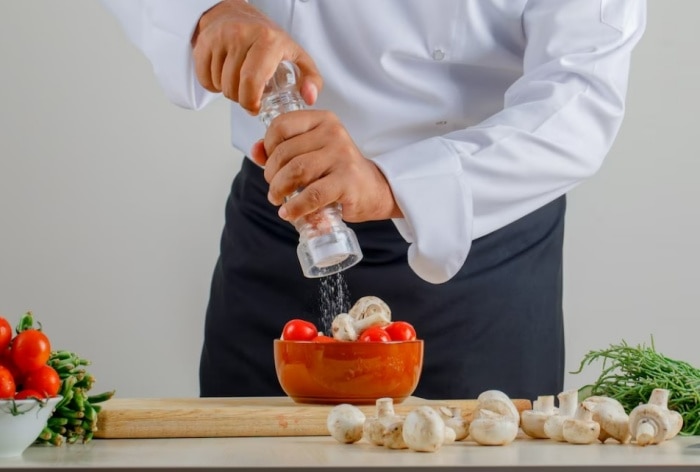The Silent Killer: Indians and the Salt Epidemic
In a recent report by India.com, a startling revelation has come to light. A new study, published in the prestigious journal 'Lancet Public Health,' has exposed a concerning trend among Indians - an alarming overconsumption of salt. This dietary habit has been linked to a slew of health issues, including high blood pressure, strokes, and heart diseases. The study reveals that, on average, Indians ingest a staggering 10.9 grams of salt daily, which is more than double the recommended intake of 5 grams per day.
The Perilous Path to High Salt Consumption
The Crux of the Problem
High salt intake is a major public health concern in India. It silently exacerbates health issues, leading to severe consequences in the long run. Understanding the factors contributing to this trend is crucial in finding effective solutions.
Unmasking Hidden Sources
One of the primary culprits behind excessive salt consumption is the use of processed foods. These often conceal high sodium levels, leading consumers down a dangerous path unknowingly. The ubiquity of processed foods in modern diets has only worsened the situation.

The Impact on Health
The consequences of this salt epidemic are dire. High salt intake is a potent risk factor for debilitating conditions such as high blood pressure, strokes, and heart diseases. It's imperative that we explore alternatives to curbing this crisis.
A Dash of Change: Alternatives to Salt
To combat this salt crisis effectively, it's essential to offer alternatives that not only maintain flavor but also safeguard health.
1. Embrace the Spice of Life
Instead of reaching for the salt shaker, consider incorporating herbs and spices into your meals. Garlic, onion, ginger, turmeric, cumin, and coriander are not only flavor-packed but also sodium-free. This simple shift can revolutionize your palate and your health.
2. Go Green with Fruits and Veggies
Fresh fruits and vegetables are nature's gift to us. They are naturally low in sodium and brimming with potassium, which actively contributes to lowering blood pressure. A diet rich in these colorful offerings can be a game-changer.
3. The Whole Truth about Grains
Whole grains are a boon for those looking to cut back on sodium. They are packed with fiber, which not only aids in lowering cholesterol but also contains significantly less sodium compared to refined grains. Opting for whole grains can be a wise choice for a healthier lifestyle.
4. Processed Foods: The Salt Trap
Processed foods may be convenient, but they come at a price. Laden with sodium, unhealthy fats, and added sugars, they pose a significant threat to our health. Minimizing their presence in our diets can have far-reaching benefits.
5. Hydrate for Health
Staying adequately hydrated is an often-overlooked solution to mitigating high blood pressure. Drinking ample water can help lower blood pressure and reduce the risk of kidney stones, promoting overall health.
Consultation with Your Health Partner
If you find yourself grappling with high blood pressure or other health conditions exacerbated by excessive salt consumption, it is crucial to seek professional guidance. Your doctor can provide personalized recommendations and strategies to help you reduce your salt intake safely.
The findings of the study published in 'Lancet Public Health' serve as a wake-up call to all Indians. Excessive salt consumption is a silent but deadly habit that must be curbed for the sake of our health. By embracing alternative seasoning options, choosing natural, whole foods, and staying vigilant about processed foods, we can take proactive steps towards a healthier future.
Frequently Asked Questions
1. What are the risks associated with high salt intake?
High salt intake is linked to an increased risk of high blood pressure, strokes, and heart diseases. It can also lead to kidney problems and osteoporosis.
2. How can I reduce my salt intake without compromising on flavor?
You can reduce salt intake by using herbs and spices, choosing low-sodium foods, and cooking at home. Experiment with different seasonings to discover new flavors.
3. Are there any specific diets recommended for managing salt intake?
The DASH (Dietary Approaches to Stop Hypertension) diet is often recommended for managing salt intake. It emphasizes fruits, vegetables, lean proteins, and whole grains while limiting salt and processed foods.
4. Can children also benefit from reduced salt intake?
Absolutely. Children can benefit greatly from a low-sodium diet to prevent the development of high blood pressure and other health issues later in life.
5. How can I track my daily salt intake?
You can track your salt intake by reading food labels, cooking at home using fresh ingredients, and keeping a food diary to monitor your daily consumption.
.png)
.png)
